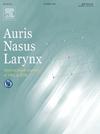Epstein-Barr virus (EBV) reactivation in post COVID-19
IF 1.5
4区 医学
Q2 OTORHINOLARYNGOLOGY
引用次数: 0
Abstract
Objective
To determine if there is a link between prolonged COVID symptoms and the reactivation of EBV.
Methods
This study was an observational (case-control) analysis involving 140 patients who tested positive for COVID-19 and are experiencing persistent symptoms such as fatigue and post-exertional malaise. Additionally, a control group of 80 individuals, matched for age and gender, who have fully recovered from SARS-CoV-2 infection without these symptoms, was included. The research took place between December 2023 and March 2024 at Benha University Hospitals in Benha, Egypt. The reactivation of the Epstein–Barr virus (EBV) was identified by detecting EBV genetic material using TaqMan probes, along with at least one set of primers (BamHI and LMP2).
Results
Initial hospitalization during acute COVID-19 infection is significantly associated with post-COVID fatigue (p-value 0.007*). No significant associations were found for risk factors like diabetes and hypertension. EBV replication observed was due to EBV reactivation rather than primary infection. EBV-specific antibody titers EBNA-1 IgG (p-value 0.004*) and EA-D IgG (p-value 0.008*). 40/140 (28.6 %) patients with COVID-19 with persistent fatigue showed EBV reactivation in contrast to 9/80 (11.3 %) of controls (P-value 0.003*) using the same detection methods.
Conclusion
EBV reactivation plays a role in Long-COVID syndrome following COVID-19 infection supporting the usage of EBV inhibitors for long-term COVID-19 treatment.
eb病毒(EBV)在COVID-19后的再激活
目的探讨新冠肺炎症状延长与eb病毒再激活之间是否存在联系。方法本研究是一项观察性(病例对照)分析,涉及140例COVID-19检测呈阳性且持续出现疲劳和运动后不适等症状的患者。此外,还纳入了80名年龄和性别匹配的对照组,这些人已经从SARS-CoV-2感染中完全康复,没有这些症状。这项研究于2023年12月至2024年3月在埃及本哈的本哈大学医院进行。利用TaqMan探针和至少一组引物(BamHI和LMP2)检测EBV遗传物质,确定eb病毒(EBV)的再激活。结果COVID-19急性感染期间首次住院与COVID-19后疲劳显著相关(p值0.007*)。没有发现与糖尿病和高血压等危险因素有显著关联。观察到的EBV复制是由于EBV再激活而不是原发感染。ebv特异性抗体滴度EBNA-1 IgG (p值0.004*)和EA-D IgG (p值0.008*)。使用相同的检测方法,40/140(28.6%)的COVID-19持续性疲劳患者显示EBV再激活,而对照组的9/80 (11.3%)(p值为0.003*)。结论EBV再激活在COVID-19感染后的长期COVID-19综合征中起作用,支持使用EBV抑制剂长期治疗COVID-19。
本文章由计算机程序翻译,如有差异,请以英文原文为准。
求助全文
约1分钟内获得全文
求助全文
来源期刊

Auris Nasus Larynx
医学-耳鼻喉科学
CiteScore
3.40
自引率
5.90%
发文量
169
审稿时长
30 days
期刊介绍:
The international journal Auris Nasus Larynx provides the opportunity for rapid, carefully reviewed publications concerning the fundamental and clinical aspects of otorhinolaryngology and related fields. This includes otology, neurotology, bronchoesophagology, laryngology, rhinology, allergology, head and neck medicine and oncologic surgery, maxillofacial and plastic surgery, audiology, speech science.
Original papers, short communications and original case reports can be submitted. Reviews on recent developments are invited regularly and Letters to the Editor commenting on papers or any aspect of Auris Nasus Larynx are welcomed.
Founded in 1973 and previously published by the Society for Promotion of International Otorhinolaryngology, the journal is now the official English-language journal of the Oto-Rhino-Laryngological Society of Japan, Inc. The aim of its new international Editorial Board is to make Auris Nasus Larynx an international forum for high quality research and clinical sciences.
 求助内容:
求助内容: 应助结果提醒方式:
应助结果提醒方式:


